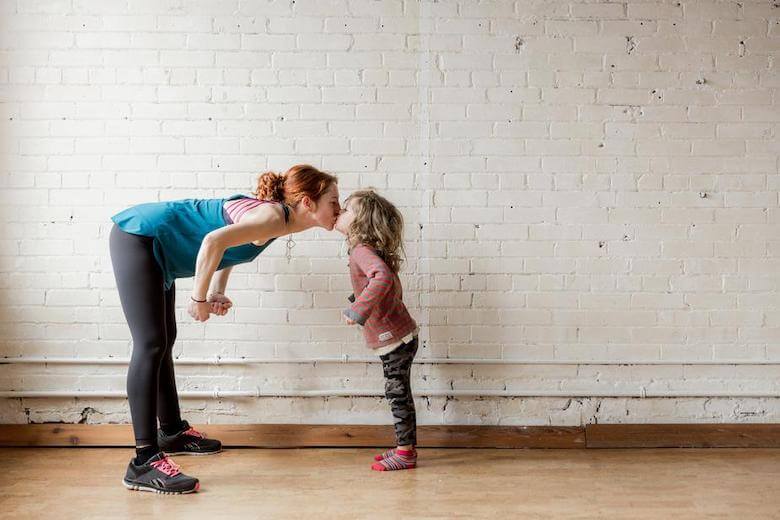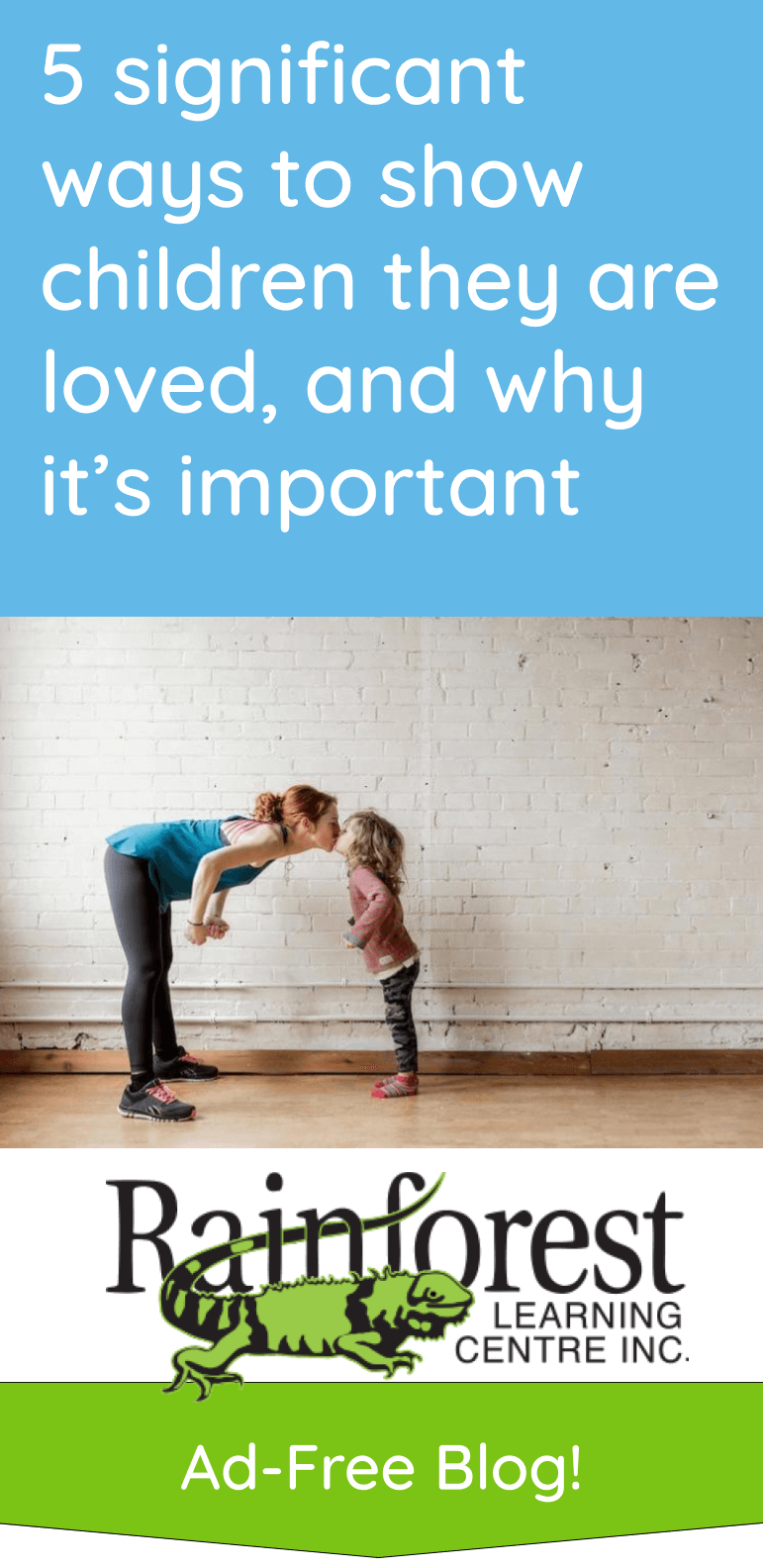
With the busyness of life comes the lack of time, and the forgetfulness, to show love to our children. But, children really need their ‘love tank’ filled. They need to know, through actions and words, that they are loved (and thus safe, and secure). If they don’t get enough visible love, they suffer. Quite literally – it affects their mentality and behaviour a lot.
So, how can parents show children they are loved? Why is it important? We’ll attempt to answer those questions below!
1) Ensure children get plenty of physical touch; kisses, hugs, back-rubs, hair strokes and hand holding are key to showing love
This can be spontaneous, but it may not be done enough in your relationship with your kids. Because, you know: life. But if your child comes up to you while you’re cooking dinner, and wants a hug, you should probably stop and give them that hug. If the food will burn or your hands are full of salmonella, try not to default to, “I can’t right now, I’m cooking” as if they should know this. Instead try, “just a second honey, I’ll give you a hug once I wash my hands.” Then hug them.
When you see them after hours at work, while they’re in daycare, or in the morning first thing, make it your mission to give them a kiss. Look them in the eye and get excited about it, too.
At night before bed, stroke their hair and back. Have cuddle time while reading.
When walking somewhere, even if it’s safe not to hold hands, hold hands anyway (if they want to!).
In the grocery store, if they sit in the kid seat of the cart, stop and do the nose rub every once in a while, with a big smile.
When your kids grow up, they may not want so much physical touch and affection. So, take the time to do it now. You’ll appreciate it later.
But, be sure that physical touch is welcomed by them. Some kids don’t like being touched. So, always ask, “do you want a hug?” or, “can I have a kiss?” if you are initiating. And, don’t make them hug and kiss strangers, or people they don’t want to hug and kiss. Those may be your important ‘persons,’ but not theirs.
See more on our blog:
- The importance of human touch in early childhood with caregivers
- The importance of eye contact in young children, and how to teach it as a social skill
- Does my child have a sensory processing disorder or are they just hypersensitive?
- How to recognize signs of Autism in early childhood and what to do next
1) Spend quality time with kids, giving them undivided attention, to show them you love them
When we say “quality time,” we don’t mean, watching T.V. together. This is also not about taking them to the park so you can use your phone while they play with friends. It’s not taking them to the grocery store with you. The so-called, ‘must do’ errand is the child. It’s not the child plus something else.
We mean, really, take the time to interact with them. For hours. And regularly. In your schedule. If you have multiple children, it may be important to set aside time for each, individually (if possible). This applies to both mom and dad, too!
As adults, kid games can sometimes be…well, not so interesting (if we’re being honest). It requires constant stimulation to interact with children. It’s tiring. Little ones are always talking, and always looking to you for a reaction. Plus, it’s boring to repeat the same line, of the same game, 50 times.
But you know what? To them, it’s not boring – it’s super special, and so fun. And you know what else? If this is ‘their’ time, it’s ok. You can relax, and just let yourself be the cash register at their pretend store for the next two hours. Until you become the horsie, or the tea guest. Or whatever.
When you set aside time to do this, you can forget about work, your list of things to do, and just slow yourself down. Be in the moment. Let them lead. You’ll probably get some good laughs out of their kid logic, too.
If your kids are a bit older, it may be that they need talking time. They need to let out their stresses. This is your time to find out what’s going on in their life. They probably won’t open up to you when you’re only giving them two minutes here and there. You don’t want to miss this.
3) Tell children you love them, with clear, indisputable words
Don’t assume that actions are enough. Sometimes, kids need to be told they are loved. We all do. If it’s obvious to you, then state the obvious. They need indisputable, factual words to know they are loved.
And, don’t do it in passing, or just when you say good-bye. “See you later, love you” is great. But, it’s almost a ritual – it may not carry as much weight as when you really, tell them.
Tell them things like, “I love you as big as _________ .” Or, “I love you all the way to the moon and back, and back around the earth again!” Make silly metaphors. Create an inside joke that you each of you know the meaning of. It will be extra special that way.
See more on our blog:
- What is normal emotional intelligence in toddlers and preschoolers?
- What is social competence in the early years?
4) Show appreciation for how they love you back, and for who they are
This is a two-in-one point.
Sometimes, kids really try. But to us adults, it may seem like their trying is a small, insignificant thing. For example, if they listen to you and clean their room, or they help little brother or sister reach a toy – that’s something! If they draw you a picture or make you a craft at daycare, they may have put their heart into this. They were thinking of you, because they love you.
Be sure that you thank them for these things, so they know their good deeds are noticed. This is not just about behavioural regulation. It’s about acknowledging that their actionable love for you matters.
But, the time for approving looks and thankfulness is not just for their good deeds. You also want to balance this act of love with outward appreciation for who the child is. This is the unconditional side of showing love.
So, if your child fails at something, let them know it’s ok, and you still love them, despite the need for age-appropriate discipline. For example, instead of losing your cool, find out what made them so upset that they threw a toy against a wall. Listen, and offer them a solution to fix the problem (they still have to fix it!). Let them be vulnerable to you, without judgement. Then be their ‘rock,’ standing by them as they solve their weaknesses.
Also, always acknowledge the traits that make them special to you. Tell them you love their smile, or their giggle, or how they always do X, Y or Z. Point out that they are very caring, or artistic, or strong, and that you think it’s great.
Finally, recognize that your ideals are not necessarily the only way to do things. Often, parents can impose their own desires on their children. They expect their children to live vicariously for them. But children are their own persons. They have their own likes and dislikes. They are not meant to be a copy-and-paste of you. They will make choices that may not be the choices you would have made. Don’t disapprove just for that reason.
Ask yourself: what is wrong with what they want? Unless it’s truly very harmful (like taking drugs or not wanting to wear a helmet – stuff like that), your opinion may serve no purpose in that situation. It may be the opposite of showing affection. Instead, support them for who they choose to be. And remember – mistakes are ok! They have to walk on their own ‘two feet’ eventually.
See more on our blog:
- How to be patient with toddlers and preschool-age children
- The importance of teaching kids decision-making skills in early childhood
- 3 ways to build confidence in young children
- 3 ways to build self-awareness in early childhood
5) Do acts of service for children, so they know they are loved and that you care about what’s important to them
You know that famous book, ‘The 5 Love Languages’? One of the ‘languages’ of showing love is acts of service. And, this can be applied to relationships with children, too.
Some may also categorize this under, “showing up.” It means that you make it to the ballet concert or the play they spent weeks preparing for. You come to the soccer game and school field trips. You are there for them, during the events of life that are important to them.
But it may also mean that you make them their favourite meal, ‘just because.’ Or you take them to play ball, because they’ve been bugging you about it. You teach them how to ride a bike, and how to hang off the monkey bars at the park. Those are the ‘big’ things in their life, even though they seem small to you. So, show them you care by doing those things with them.
See more on our blog:
- 5 Fun, purpose-driven walks to go on with daycare kids or preschoolers
- 5 Imagination games to play with toddlers and young kids
- Family fun activities in Vancouver for preschoolers and young kids on no-daycare days
Why is it critical for children to feel loved?
Children who are shown affection tend to have better mental health. This is supported by multiple studies, as reported by Mother.ly here. It reduces stress, and allows children to grow into happy adults who can have relatable experiences with others. On the flip side, children who are not shown love can become lonely and unpleasant adults. For example, the extremity of attachment disorders can be emotionally and mentally damaging to children.
When children are distressed, it goes without saying that their internal state will affect them outwardly too. How can a sad person focus on learning in school, for instance? And, if a child has not had love demonstrated to them in early childhood, how can they go on to learn to show love, or even just tolerance, to others? Our actions towards, and around children, are more impactful than we think.
In all, we have seen that love can be expressed in more than one way. And, our simple, daily – even spontaneous – activities with children can influence their perception of being cared for. Children need ‘multifaceted’ love. So, that means, not just with words, but with actions and affirmations too. The good news is that this is simple to do! A simple hug, a devoted playdate with kids, or thanking them for their love towards you is all part of the equation!
See more on our blog:
- Attachment parenting and daycare: how does it work?
- What is a parenting coach and do I need one?
- What is a balanced parenting style for toddlers and preschool-aged children? Here are 3 answers.
- How to be patient with toddlers and preschool-age children
- Free parenting classes and learning resources for Vancouver-area residents
- The power of father involvement in early childhood development
